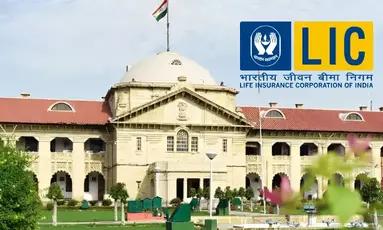In a significant ruling, the Allahabad High Court held that Life Insurance Corporation of India (LIC) cannot repudiate a life insurance claim on the ground of non-disclosure if it issued the policy after accepting an incomplete proposal form. The Court emphasized that the insurer has a duty to verify material details before issuing the policy, and failure to do so bars later denial of claims.
Read Also: Once Goods Are Verified in MOV-04, Revenue Can't Shift Its Stand Later: Allahabad High Court
The case involved Santosh Kumar, whose wife Meera Devi took a life insurance policy from LIC for ₹15 lakhs in August 2018. She passed away in July 2019 due to a heart attack. As the nominee, Kumar applied for the death claim but LIC rejected it, citing non-disclosure of a previous policy taken by Meera Devi in May 2018.
Kumar argued that his wife had disclosed all previous policies to the LIC agent, who assured her that those were already in LIC’s records and need not be written again. Based on this assurance, certain columns in the proposal form were left blank. LIC, despite this, issued the policy and accepted the premium.
The High Court observed:
“If any column in a proposal form is left blank, and the insurance company still accepts the premium and issues a policy, it cannot later repudiate the contract citing non-disclosure.”
Read Also: JEE Main Re-Exam Denied: Allahabad High Court Rejects Plea Citing Traffic Jam Delay
The Court referred to Section 45 of the Insurance Act, 1938, which states that no policy can be questioned after three years except on grounds of fraud or material suppression. Even within three years, fraud must be proven. The law places the burden of proving fraudulent suppression on the insurer.
The bench noted:
“There was no deliberate suppression of the earlier policy. The policy in question was issued barely three months after the previous one. LIC failed in its duty to cross-check existing records linked to Aadhaar and PAN.”
It further pointed to key judgments such as Manmohan Nanda v. United India Assurance and Mahakali Sujatha v. Future Generali, which held that insurers cannot later claim suppression of facts if the proposal form was incomplete and yet accepted without clarification.
Read Also: Allahabad High Court Slams Habit of Seeking Adjournments: Calls Litigants’ Role in Delays a “Menace”
The court also highlighted the contra proferentem rule:
“When contract terms are unclear or ambiguously worded, the interpretation should go against the party that drafted them — here, the insurer.”
The Insurance Ombudsman had earlier dismissed Kumar’s complaint citing procedural issues like jurisdiction and limitation, which the High Court deemed arbitrary and lacking application of mind.
The Court concluded:
“If the insurer accepts a proposal form with blank fields, and the insured dies due to unrelated causes like a sudden heart attack, the insurer cannot escape liability. Due diligence is their responsibility.”
Setting aside the orders of LIC and the Insurance Ombudsman, the High Court directed LIC to pay the insured sum to the petitioner within six weeks.
This judgment reinforces the principle that insurance companies must exercise proper diligence at the time of issuing policies and cannot later deny claims based on overlooked blanks or agent assurances.
Case Title: Santosh Kumar v. Assistant Secretary/Deputy Secretary/Secretary, Insurance Ombudsman, Lucknow and Others [WRIT-C NO. 21818 OF 2023]















